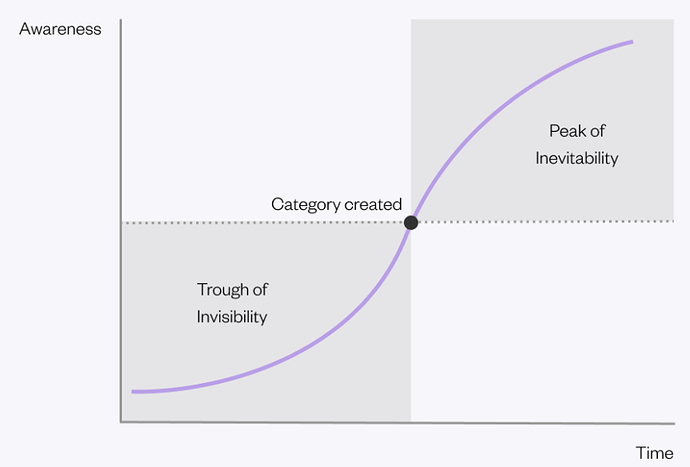I think it would be great if we were able to create a world in which ImpactDAOs augment every income. Such a world would have a systemic incentive for the worlds agents (humans, AIs) to care for the commons, creating web-scale human thriving.
For those of you who have followed the work @Aleborda21 and I have been doing to map out ImpactDAOs, you know that we feel a special responsibility to help ImpactDAOs find each other. Since Gitcoin was one of the first ImpactDAOs, we feel a responsibility to create a schelling point for other ImpactDAOs. We want to create the category & support the category as it moves from invisible to inevitable.
Category creation is creation is an ongoing exercise in tenacity, perception and positioning. Our task is to amplify the understanding of ImpactDAOs within the ecosystem, and to help ImpactDAO members find each other + support each other. It is about repeatedly creating & reinforcing positive feedback loops until the ImpactDAO category is inevitable.
I would like to elicit ideas for how to create/support the ImpactDAO category until it is inevitable.
A thriving ImpactDAO Category would itself be a public good for the space. Positive Impact is an end in itself, but it is also a means to another end - creating a positive reputation for the web3 space to everyday people.
Some ideas discussed at AMS devconnect. Posting them below to get the Category Creation juices flowin’:
- An ImpactDAO registry with credibly neutral governance for weighting which ImpactDAOs have the most impact
- Another 2nd iteration of the ImpactDAO book
- A certified Impactdao label (similar to certified organic label)
- Proof of impact / Impact certificates
- Impactdao social events where you can meet other impactdao leaders.
- A weekly ImpactDAO Digest, similar to the GitcoinDAO Digest but about all ImpactDAOs. Such a resource would allow ImpactDAOs to keep up on each others developments.
- Anything that helps ImpactDAOs raise money or otherwise have a sustainable economic model
- something else? open to ideas.
If you have ideas + want to implement them, I would like to talk to you. Please (1) join this telegram (2) post a proposal below in 500 words or less that articulates how you would attack this problem and what would have to be true for it to happen (hint: please ask for funding, I want to fund good proposals!).
